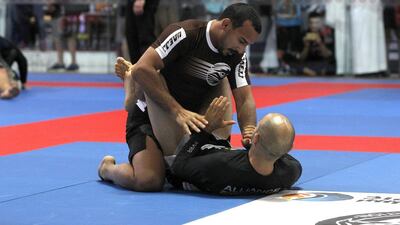ABU DHABI // Taleb Saleh Al Kirbi is shaping up to be the new golden boy of UAE jiu-jitsu.
Elevated to black belt, Al Kirbi is the second Emirati to achieve that honour after his more celebrated UAE teammate Faisal Al Ketbi.
Al Kirbi has now struck gold in both his appearances since reaching black belt.
He edged out his national team teammate Mohammed Al Qubaisi in the 76-kilogram weight class in the Ramadan Cup no-gi competition at the Armed Forces Officers Club on Friday night.
Photo gallery: UAE jiu-jitsu fighters win 13 medals during Day 1 of Ramadan Cup
Last month, he returned with a winner’s medal in the Jiu-Jitsu Asian Union (JJAU) South and Central Asia qualifier at Bangalore. Prior to becoming a black belt, he won gold at the Asian Beach Games in Phuket last November but had to settle for silver in the Abu Dhabi World Professional Championships in April as a brown belt.
“To compete in the black belt division is a new challenge,” Al Kirbi said. “It is a lot tougher, but that’s what the sport is all about, testing your capabilities at the highest level.”
He had one opponent, Brazilian Thiago Silva, to overcome while Al Qubaisi had to go through two bouts, both against Brazilians – Jose Junior and Alexandre di Salgado.
“Losing to Taleb wasn’t a problem,” said Al Qubaisi, who was also a gold medallist at the Bangalore event
“He’s a tough opponent and I am one level (brown belt) below him. I managed to give him a good fight.”
Jose Junior, Al Qubaisi’s opponent in the opening bout, experienced a tough start in his first competition in the UAE.
“I arrived last week after joining Palm Sports (the technical arm of the UAE Jiu-Jitsu Federation) as an instructor and entered this event,” said the 35-year-old Pan American and two-time Brazilian national champion.
“It was a great first experience for me to compete with a national team player and learn the level of their skills. I have been an instructor for over 10 years but compete regularly.
“I haven’t been training for more than two weeks, as I had to prepare to fly over to the UAE, but I will start training and raise my game to take part in the next competition.
“But it shouldn’t take anything away from Mohammed’s victory. I came across an opponent who was strong both technically and physically.”
The Emirati fighters won four gold, four silver and five bronze medals in the 15 weight categories that were on the mats during the first day of the two-day competition.
Anes Ali Albareq took the 76kg purple belt gold from John O’Reilly of Ireland.
“I have been getting better every year since I started practicing the martial art four years ago,” the UAE-born Yemeni said.
“It is my third year, and I am returning with a gold medal after the bronze and silver I won in the first two years. I just love this competition because it has an international flavour with a good number of expatriate and foreign participants.”
The remaining gold medals were shared by winners from 10 different countries – Brazil, New Zealand, Iran, the United States, Great Britain, Bahrain, Comoros, Azerbaijan, Jordan and Turkmenistan.
apassela@thenational.ae
Follow us on Twitter at NatSportUAE


